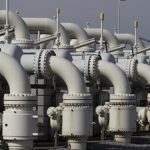LAHORE: The government on Saturday said that supply of natural gas to general industrial units, mainly in Punjab, would be restored from Tuesday following resumption of supply from the Mol gas field and provision of increased amounts of Re-gasified Liquefied Natural Gas (RLNG).
The restoration of supply to the Compressed Natural Gas (CNG) sector is also expected within the next week, subject to consistent supply of indigenous gas and RLNG into the system, according to official sources in the Sui Northern Gas Pipelines Limited (SNGPL).
“Since supply to zero-rated export industry (carpets and textile, sports and surgical goods plus leather) has been continuing, it has been decided that supply of RLNG to the general industry will be restored from Tuesday, Dec 31.
“The decision had been taken in view of resumption of gas supply from the MOL gas field as well as increased RLNG supply,” the sources said.
CNG sector will also start getting natural gas soon
“Supply to CNG stations will be restored soon after that. Suspension of supply or reduction in the amounts supplied to the general industry, the CNG sector and some power plants was necessitated due to record low temperatures recorded in December this year. Also, the supply of RLNG to the domestic consumers had to be increased to 500MMCFD in the last week of this month, against the average consumption during last December of only 150MMCFD, owing to drastic change in weather. “The company (SNGPL) is undertaking all efforts to ensure supply of gas to high-priority domestic consumers,” the sources added.
According to an official in the ministry of energy (power division), the company at present is receiving 2,148MMCFD of gas, including 958MMCFD of indigenous gas, 1,075MMCFD of RLNG and 115MMCFD of gas due to increase in the pressure line pack in the system. Another 170MMCFD is being supplied exclusively to independent power producers and fertiliser industry, etc, through dedicated pipelines. Thus, 2,148MMCFD is being supplied to the domestic, power and zero-rated industrial sectors.
“So, at present there is no gas shortfall,” the official claimed. Restoration of gas supply to the CNG sector would also be done after resumption of supply to the general industry.
The Mol gas field in Khyber Pakhtunkhwa resumed its operations at the optimum level of 325MMCFD on Thursday after the local residents, who had reduced its production to 125MMCFD in a bid to force both the federal and provincial governments to accept their demands, finally allowed the officials concerned to run it optimally after being assured that their issues would be resolved.
“Karak’s residents had forcibly curtailed the gas field’s production to 125MMCFD a few days ago. This caused increase in gas shortfall which crossed 400MMCFD, leaving the SNGPL with no option but to either suspend or curtail supply to the CNG, general industry and power sectors in a bid to cater to needs of about six million domestic consumers in both Punjab and Khyber Pakhtunkhwa,” the official explained.
He said the residents living near the gas fields in Khyber Pakhtunkhwa don’t pay bills and at times use various tactics to force the government to lay pipelines or build roads, etc. “Although the company has been facing this situation since long the provincial government has never handled the matter strictly. However, recently the government approved Rs9 billion for launching various development works, including gas pipelines and roads infrastructure, in these areas,” he said.
The SNGPL had on Dec 19 halted gas supply to the general industry — mainly manufacturing and CNG sectors — to meet energy needs of domestic consumers in cold weather. On Dec 23 the company also curtailed supply to various power plants that led to electricity shortfall and ultimately to electricity loadshedding in the areas falling within the service jurisdiction of high-loss 11kV feeders.
On the other hand, the domestic sector is still facing extremely low gas pressure or no gas at all in the tail-end areas for the last many days. “Since the start of December, we have been facing extremely low gas pressure, leaving us with no option but to use very expensive LPG for preparing food in such a harsh weather,” said Inam, a resident of Kot Kamboh, near Babu Sabu and Sabzazar.





